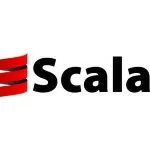Scala
Alternating between Spray-servlet and Spray-can
On a server you may want to deploy your application as a war. How to build a war with spray-servlet. Locally it’s easiest to run without an application server.
We include both the spray-servlet and spray-can dependencies:
01 02 03 04 05 06 07 08 09 10 11 12 13 14 15 16 17 18 19 20 | name := "sprayApiExample"version := "1.0"scalaVersion := "2.11.6"libraryDependencies ++= { val akkaV = "2.3.9" val sprayV = "1.3.3" Seq( "io.spray" %% "spray-can" % sprayV, "io.spray" %% "spray-servlet" % sprayV, "io.spray" %% "spray-routing" % sprayV, "io.spray" %% "spray-json" % "1.3.1", //has not been updated yet "com.typesafe.akka" %% "akka-actor" % akkaV )}//This adds tomcat dependencies, you can also use jetty()tomcat() |
We make a trait with all the common functionality. We extend both SprayApiServlet and SprayApiCan from it.
01 02 03 04 05 06 07 08 09 10 11 12 13 14 15 16 17 18 19 20 21 22 23 | import akka.actor.{ActorSystem, Props}import akka.io.IOimport akka.pattern.askimport akka.util.Timeoutimport spray.can.Httpimport spray.servlet.WebBootimport scala.concurrent.duration._trait SprayApi { implicit val system = ActorSystem("SprayApiApp") val apiActor = system.actorOf(Props[ApiActor], "apiActor")}//for use with spray-servletclass SprayApiServlet extends WebBoot with SprayApi { override val serviceActor = apiActor}//for use with spray-canobject SprayApiCan extends App with SprayApi { implicit val timeout = Timeout(5.seconds) IO(Http) ? Http.Bind(apiActor, interface = "localhost", port = 8080)} |
- You can see the whole example here.
| Reference: | Alternating between Spray-servlet and Spray-can from our JCG partner Tammo Sminia at the JDriven blog. |





